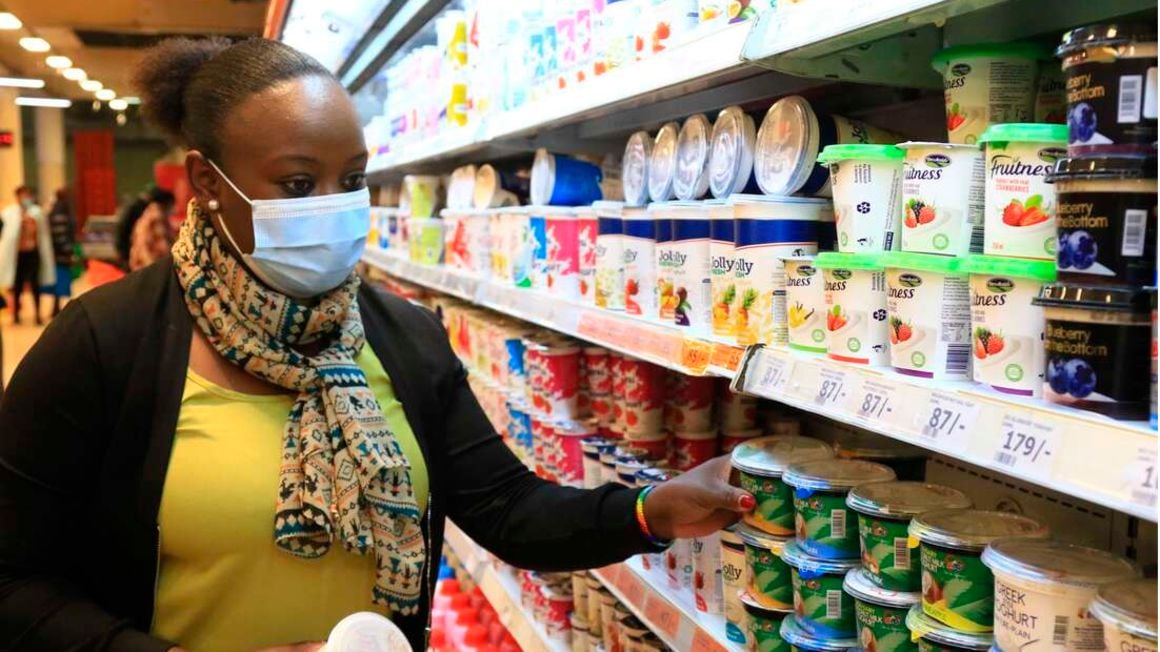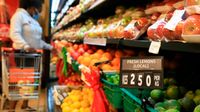
A customer shops for dairy products at Naivas supermarket in Nyeri. PHOTO | JOSEPH KANYI | NMG
Kenyan manufacturers are quietly downsizing their packages and product sizes without lowering prices as they embrace shrinkflation in the wake of sharp rice in cost of production.
A Business Daily research has found that the phenomenon - borrowed from elsewhere in the world -- is quickly catching up across almost all product categories from toilet paper, yoghurt, bread to confectionary.
Experts said last week shrinkflation is not a new phenomenon. The practice becomes more common during periods of high inflation, as businesses struggle to keep up with rising expenses for ingredients, packaging, labour, and transportation, analysts said.
In recent weeks, ingredients and the costs of manufacturing are getting pricier and this is resulting in two things; higher prices or smaller sized products.
A spot check by the Business Daily on Friday showed that many of the product size changes are subtle for a customer to easily notice.
For instance manufacturers are changing the shape of their products like confectionary including chocolate so that customers can barely notice the difference in weight when paying for it.
The practice thrives in markets where consumers are not weight conscious, allowing manufacturers to shrink the sizes of products.
The practice is not illegal as long as manufacturers seek consent from the standards regulator, the Kenya Bureau of Standards, (Kebs).
Kebs managing director Bernard Njiraini told the Business Daily that it was on high alert for firms flouting regulations by altering the size of goods without seeking its permission.
“We have intensified the surveillance,” said Mr Njirani in interview. “Whatever is stated by the manufacturer should be what is provided.”
The Business Daily spot check found that essential consumer goods like bar soaps, bread, confectionary, milk products are some of the worst affected by the practice.
Mr Njiraini said in interview construction materials especially steel products were also affected.
“We have encountered steel products that are noncompliant with dimensions, for instance the mass per meter,” he said.
“This is something that we are concerned about.”
Manufacturers when reached for comment last week admitted that the cost of production has gone up leading some players to add the margins for their products.
“Manufacturers have been experiencing rising cost of production due to increased tax rates, shortage of dollars and increased cost of logistics due to supply chain challenges and world commodity prices,” said their lobby Kenya Association of Manufacturers (KAM) in response to Business Daily queries.
KAM said manufacturers strive to absorb increasing cost of production, as much as they can, before passing it down to consumers.
“However, there are limits to the extent to which manufacturers can bear such costs,” it said.
“This has seen manufacturers pass this cost to consumers by increasing in the cost of some products as they strive to remain afloat.”
But the manufacturers ruled out any cheating by firms.
Kenya’s inflation rate climbed for a fifth consecutive month in July as food prices soared, remaining above the ceiling of the central bank’s target range.
Annual inflation quickened to 8.3 percent from 7.9 percent in June, the Kenya National Bureau of Statistics (KNBS) reported on Friday, on the back of a jump in the price of essential items like cooking oil, food, fuel and soap, squeezing household budgets and demand for goods and services.
The cost of living measure had risen to 7.1 percent in May from 6.5 percent the prior month.
This was the highest jump in inflation since February 2020 when it stood at 7.2 percent, prompting the Central Bank of Kenya (CBK) to warn that the measure risked rising above the government’s target range of 2.5-7.5 percent.
This has forced many households, especially in the low-income segment, to reduce their shopping basket in an environment where firms have frozen salaries as they recover from Covid-19 economic hardships.
The rise in the cost of essential commodities has forced workers to cut back spending on non-essential items such as beer and airtime, ultimately hurting firms like East Africa Breweries Limited (EABL) and Safaricom.
Consumer lobbies urged manufacturers to provide what they promise.
“There are many cases of single ply tissue papers and even lesser perforated pieces in tissue papers, bread with less weight but same size - too many holes, underweights that do not match the package labels, half empty coffee, chocolate, tea and nearly everything else,” said Consumers Federation of Kenya (Cofek) secretary-general Stephen Mutoro.
The State mid-July struck a deal with millers to cut the price of maize flour to Sh100 under a Treasury-backed subsidy.
President Uhuru Kenyatta mid-July also took charge of the fuel price review three weeks to the August polls as he sought to ensure that the rising fuel prices do not snowball into a political crisis.
This is after State House in an unprecedented move took charge of the process and that saw the government take a big hit to keep the prices unchanged in the month to August 14 to diffuse public outrage as Kenyans go to the ballot.
bnjoroge@ke.nationmedia.com



No comments:
Post a Comment